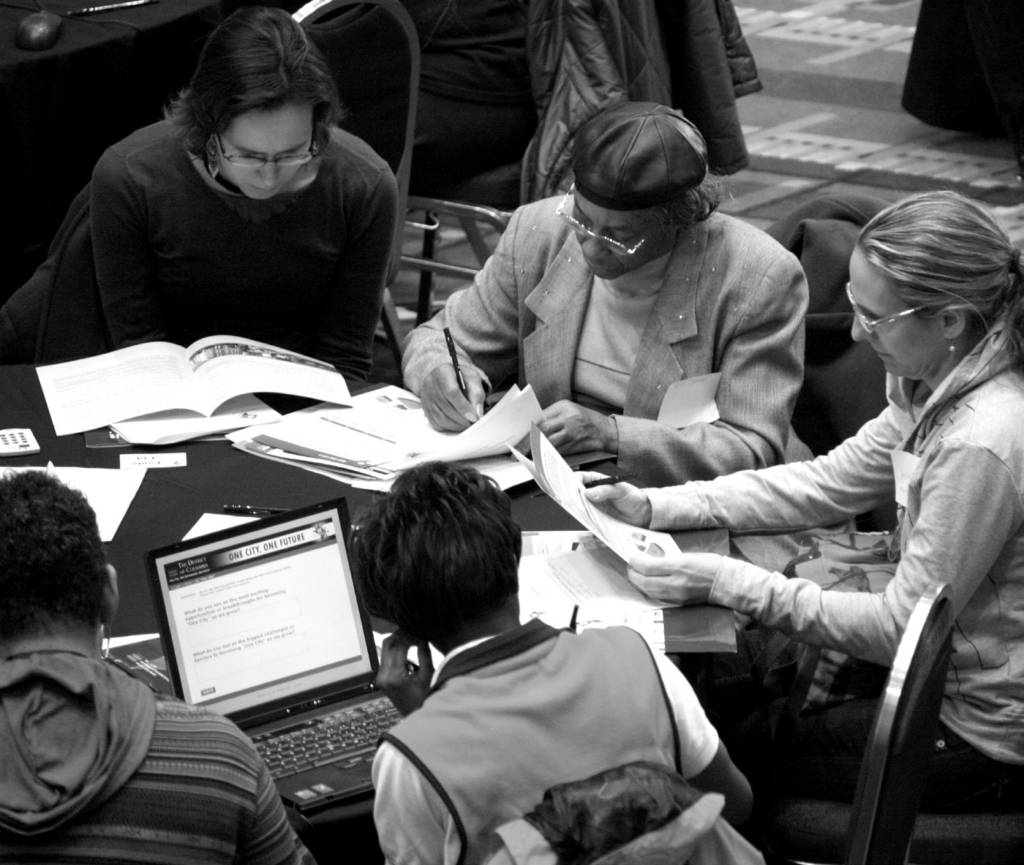For Mayor Vincent Gray, the One City Summit represented a crucial step in making the slogan “One City” into a reality for Washington, D.C.
“This is real-time, grass roots democracy, D.C. style,” Gray said in his welcome message.
Even in the face of progress, the mission of bringing together a city facing economic, racial and cultural barriers presents challenges, Gray acknowledged in his remarks to the crowd gathered at the Walter E Washington Convention Center for the Feb. 11 event.
The District’s population expanded from 572,000 in 2000 to 618,000 by late 2011, the mayor said,
and eco- nomic growth, particularly in the retail sector has been robust. Yet in spite of the
positive indicators, there are still communities within the city that remain isolated from
advancement, Gray said.
“Many Washingtonians aren’t benefiting,” he said. “Don’t we agree that everyone deserves the opportunity to make progress?”
The roughly 1,700 citizens representing each ward of D.C. who assembled at the convention center and the several hundred more who streamed the event from home or public computers spent the day mulling the complexities of that question.
Gathered at round tables, intended to encourage open discussion and engagement, participants explored the meaning of making Washington “One City” and shared thoughts about how to overcome challenges and build on the city’s strengths to improve the quality of life for all residents. Those participating online could comment and tweet with other viewers, as well as read updates from event staff.
Participants were asked to focus their discussions upon four priorities: creating a more diverse economy; ensuring more successful child development for infants and toddlers; educating young people for successful futures; and aligning resident’s job skills with the local economy. Through-
out the meeting, participants used electronic voting devices, which resembled small calculators, to register their views on challenges and priorities. Webcast participants were also able to vote online.
At one point, participants were asked to rank what they saw as “the biggest challenges to becoming
one city as we grow.”

The lack of affordable housing and the pressures of gentrification drew the largest response, garnering 17 percent of the vote. Another 15 percent of respondents voted that corruption, perceived corruption and mistrust of city government represented the biggest obstacle. Factors such as income inequality, uneven access to good education and other problems gained smaller portions of the vote, according to a preliminary report issued by the mayor’s office following the event.
At another point in the meeting, participants were asked to rank possible investments aimed at stimulating growth in neighborhoods. Converting unused properties into community centers for job training and adult education was the most popular idea, drawing 42 per- cent of the vote. Ideas such as creating a hub for non-profit organizations and providing tax incentives for small businesses also drew significant interest.
Participants were also asked to rank the challenges local elementary schools need to tackle in order to ensure that children succeed.
Teaching social skills such as cooperation and conflict resolution gained the most votes, a 20 percent share, with teaching basics subjects such as reading writing and math coming in a close second, with 19 percent of the vote. Other voters selected such priorities as teaching second languages and hiring and retaining caring and effective teachers.
Participants gave many reasons for coming out to the event. Some said they wanted to make their
voices heard, while others said they wanted a better understanding of the mayor’s vision for the
city. Others, including Gary Minter said they came to speak up for issues such as affordable
housing. Minter said he believed that the summit was a good idea but that the real challenges lie ahead.
“I think it was a productive day. It gave people a feeling they had some voice,” said Minter, a Street Sense vendor and member of the People for Fairness Coalition, an organization made up of homeless men and women who advocate for social safety net programs. “The question is,” asked Minter, “will the politicians listen to what the people said? Will they follow up?”
The event was facilitated by AmericaSpeaks, a nonprofit organization that engages citizens in public decision-making. Steve Brigham, chief operating officer of AmericaSpeaks, said he was impressed by the turnout and the quality of participation.
“The full room for the majority of the day is a testament to how engaged the citizens were,” said Brigham. “As for the mayors team, they are extraordinarily pleased by the level of engagement in areas they are concerned about.”








